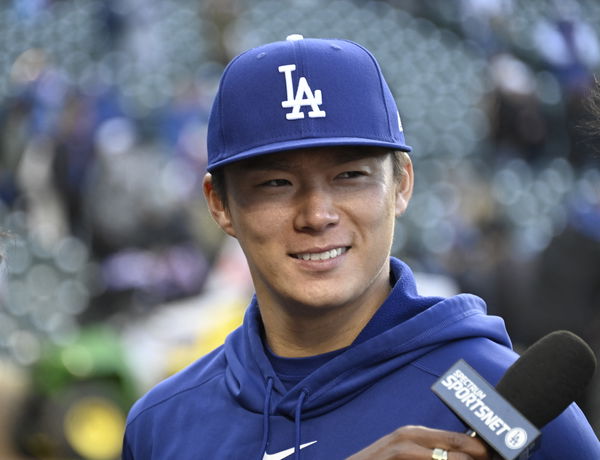
USA Today via Reuters
Apr 6, 2024; Chicago, Illinois, USA; Los Angeles Dodgers pitcher Yoshinobu Yamamoto (18) smiles after winning his first MLB baseball game against the Chicago Cubs at Wrigley Field. Mandatory Credit: Matt Marton-USA TODAY Sports

USA Today via Reuters
Apr 6, 2024; Chicago, Illinois, USA; Los Angeles Dodgers pitcher Yoshinobu Yamamoto (18) smiles after winning his first MLB baseball game against the Chicago Cubs at Wrigley Field. Mandatory Credit: Matt Marton-USA TODAY Sports
Yoshinobu Yamamoto arrived in the MLB with a bang, and his presence in the Dodgers dugout extends beyond his undeniable pitching talent. Teammate Tyler Glasnow paints a picture of a focused, humble, yet remarkably confident young athlete. Glasnow’s insights reveal a side of Yamamoto the media rarely sees—a Japanese pitching prodigy who isn’t just winning games but winning hearts with his relentless pursuit of improvement.
Watch What’s Trending Now!
“He’s very humble… He’s like a samurai, I guess,” Glasnow muses. “For being a 24-year-old guy, first year in the big leagues, not speaking the language, his confidence is—and it’s not like an arrogance—it’s very much like he’s comfortable in his skin 24×7.” The admiration is clear in Glasnow’s voice; Yamamoto’s poise under pressure is the mark of a special kind of player. Glasnow’s half-joke about Yamamoto having a “Samurai” quality seems to hit the mark closer than he realizes.
The comparison to a samurai isn’t just about Yoshinobu Yamamoto’s composure. It’s also about dedication. His teammate reveals that even after long games and workouts, Yamamoto diligently attends English classes. “He’s very consistent,” Glasnow says. “Like, his English is insanely good for the amount of time you spent here; it gets better every single day… He goes to the field, he does all this stuff, and then he goes to English class like a bunch.” The language barrier is a hurdle that Yamamoto is systematically dismantling.
ADVERTISEMENT
Article continues below this ad
That tireless focus makes the Japanese youngster a fascinating dugout companion. Glasnow shares that their conversations range from technical pitching stuff to everyday banter. “We talk about, like, how’d you feel during the start, uh, he just like, kind of small little sentences and stuff… what he does off the field, like, how you doing, and we just have normal Dugout conversations sometimes, like, how do you pitch a guy, or how’d you feel, or like, what did this pitch feel like?” Their bond transcends the pitcher’s mound, making Glasnow one of Yamamoto’s biggest fans. But beyond Glasnow’s insightful comments, what else makes this story compelling?
ADVERTISEMENT
Article continues below this ad
Yoshinobu Yamamoto has arrived in a league where Japanese stars like Shohei Ohtani have set impossibly high standards. Yet, Yamamoto doesn’t seem overwhelmed. The kid’s got star quality, and Glasnow’s praise paints a picture of a young athlete blossoming into a vital part of the Dodgers’ roster.
Yamamoto’s mastery of English adds another layer to his success story. In a sport where communication is key, his dedication to the language shows an investment in his team, not just himself. It’s easy to envision Yamamoto becoming a fan favorite, breaking down barriers with both his pitching and his personality. Although, his journey isn’t without its fair share of challenges.
The Samurai Spirit: How Yoshinobu Yamamoto faces challenges with grace
The grueling MLB schedule and cultural adjustments must be immense. But Yamamoto’s mental toughness, as highlighted by Glasnow, suggests he’s handling it all with remarkable grace. It’s still early, but there’s something deeply compelling about this young pitcher’s trajectory.
How did Yoshinobu Yamamoto make this play?!? 😳 pic.twitter.com/hAYXw3pc83
— MLB (@MLB) April 25, 2024
Tyler Glasnow calls Yamamoto “one of my favorite guys to sit next to in the dugout.” Perhaps that’s the most telling praise of all. Glasnow hints at a genuine camaraderie, a sense that Yamamoto isn’t just a talented teammate but a potential friend. This is more than a glowing performance review; it’s a glimpse into the human side of baseball and the unique bond forming between two pitchers at the top of their game.
ADVERTISEMENT
Article continues below this ad
He mentions Yamamoto’s “insanely good” English, something that takes on greater significance when considering the cultural shift a young Japanese athlete must navigate. Imagine the pressure of performing at the highest level while simultaneously grappling with a new language in a new country.
There’s a heartwarming aspect to Yoshinobu Yamamoto’s language journey. It’s a two-way street, yes, but his efforts to communicate not only benefit him but foster a stronger team dynamic. Imagine the camaraderie that blossoms when teammates can truly connect, share strategies seamlessly, and celebrate victories together without language barriers.
ADVERTISEMENT
ADVERTISEMENT
ADVERTISEMENT
ADVERTISEMENT

